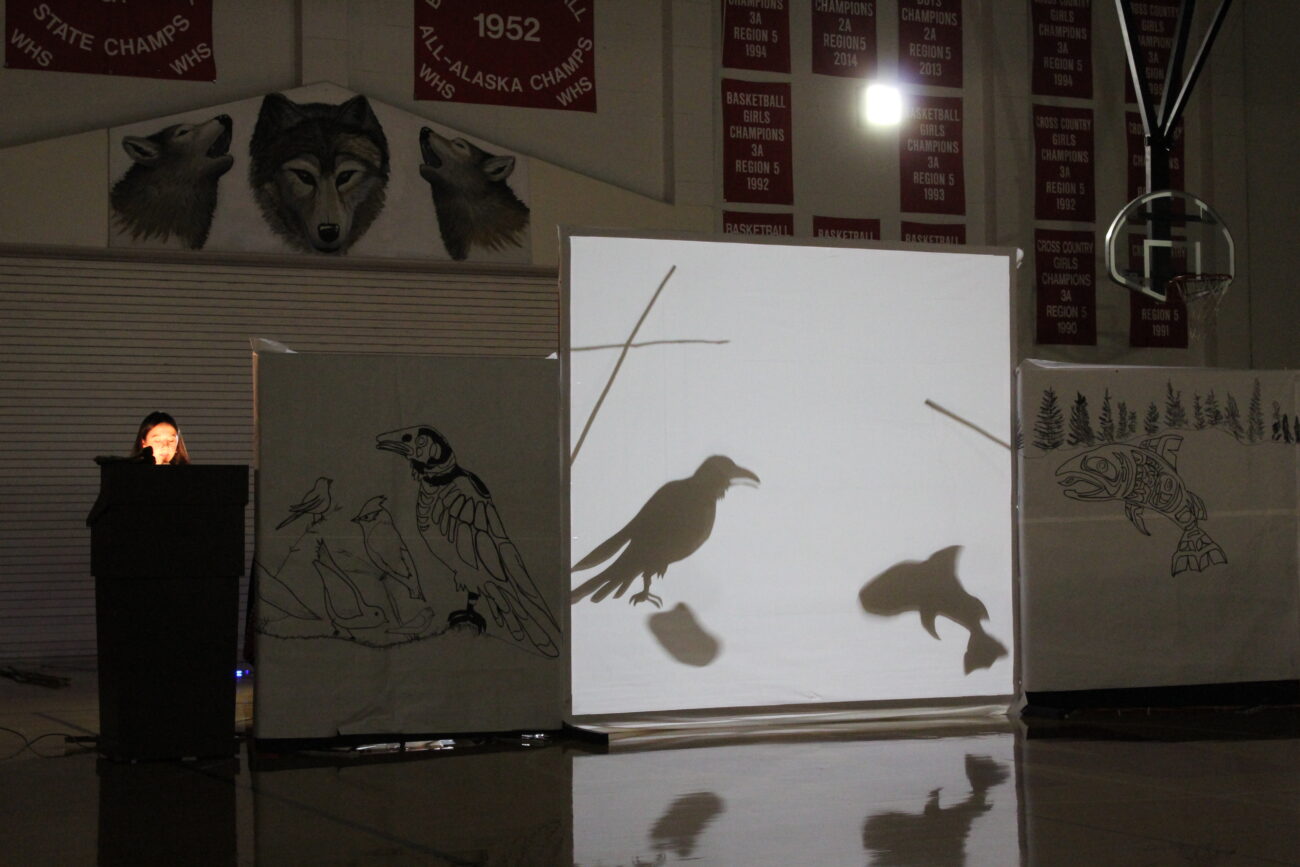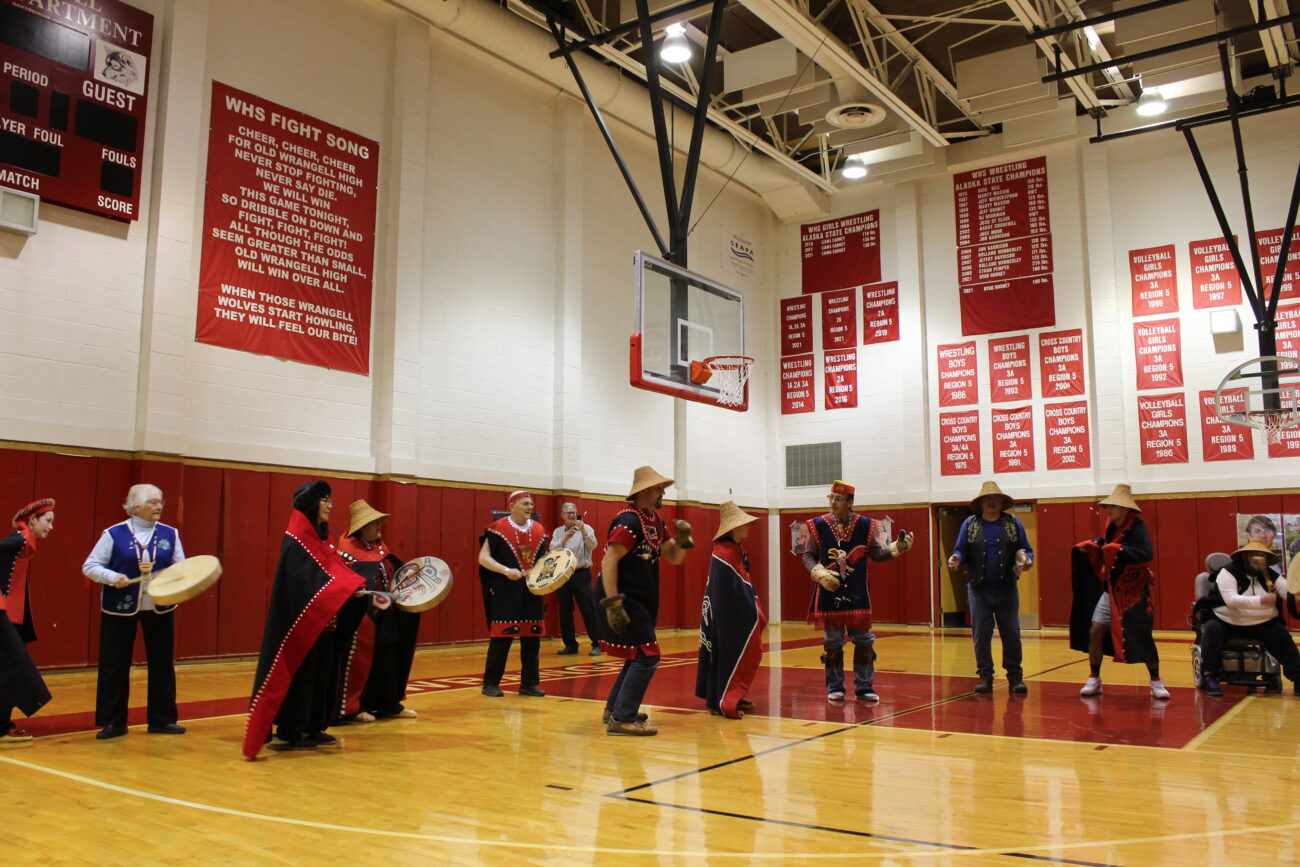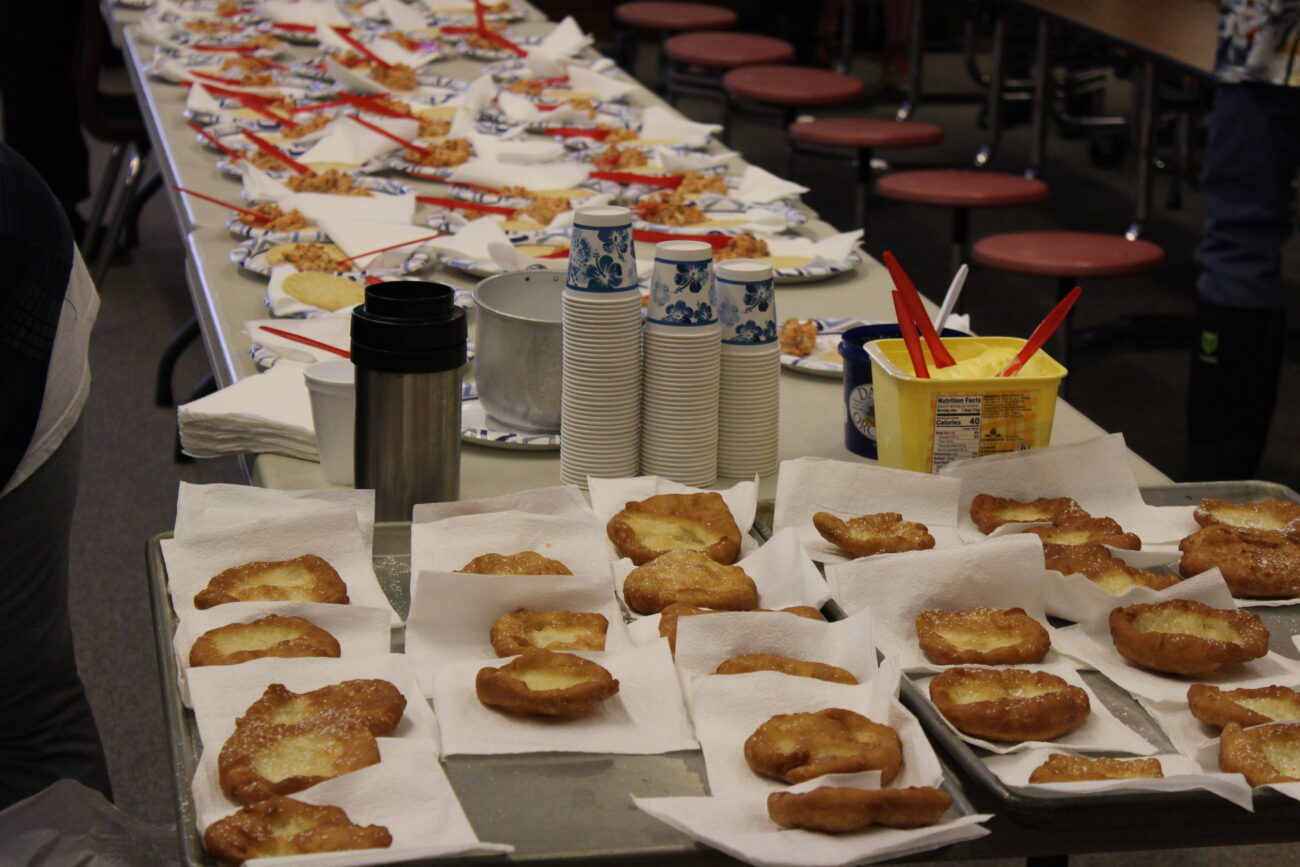
(Sage Smiley / KSTK)
In many Indigenous stories in Alaska, Raven is a clever and enterprising character. That’s also the case in Lingít storytelling. Wrangell students recently brought a story of Raven’s antics to life with a shadowbox theater performance.
Lingít stories tell of how Yeíl (Raven) brought light to the world and helped ensure the tides rise and fall each day. One story of Raven and King Salmon also tells of Raven’s trickery, and gives some explanations for the markings and migratory patterns of birds in the region.
The story is told by Katherine Mills and translated by Nora Marks Dauenhauer and Richard Dauenhauer. This fall, it was featured in a celebration at Wrangell High School.
After the local dance troupe sang and danced the Wrangell ‘Coming In’ song, the lights went out, except for a large white sheet, lit from behind. Beginning Lingít students held cut out birds and fish shapes on strings to act out the story. Clara Waddingon narrated.

(Sage Smiley / KSTK)
Told by Katherine Mills. Translated and edited by Nora Marks Dauenhauer and Richard Dauenhauer.
Raven was going along the beach.
While he was going along there, he saw the King Salmon.
It was jumping out there in the bay. He was thinking
about it then,
“What can I do to that King Salmon
to trick him into coming ashore?”
How far had he gone
when he found the greenstone?
Maybe he placed it on top of a rock.
That’s when
he puts down around it.
That’s when he said to the salmon,
“Hey, Salmon,
listen here!
This little greenstone is saying this about you,
‘You dirtygilled person!’”
But the King Salmon didn’t listen to him.
Then he was jumping out there again.
That’s when he’d say to him again, “Hey, King Salmon,
this greenstone is insulting you.
Listen to what he’s saying! Swim on in here!
But King Salmon was just swimming out there.
He didn’t listen to him.
At what point was it he hollered out,
“Hey, King Saaaaaaaaalmon!
Swim in heeeeeeeeere
so you can really hear what the little greenstone is saying about you!”
That’s when he finally started swimming toward him.
While he couldn’t believe it, King Salmon swam up on the beach.
That’s when [Raven] said to him,
“Oh, no!
Oh, no!
It occurred to me that I really have to go [to the bathroom]!
I’ll run up in the woods first.”
Then he ran up.
Here he ran to get a club from up there.
Then he ran down with the club and hit that salmon on the head with it.
But the salmon was too heavy for him.
The birds that fly in flocks
are [Raven’s] grandchildren.
That’s when he said to them,
to these grandchildren of his, “Help me.
Let’s pull it up here.
We’ll bake this salmon in a pit.”
Then, with the help of his grandchildren,
he digs a pit.
“Run up in the woods!
Bring down some skunk cabbage.
We’ll put them on the bottom of the pit.
We’ll wrap it. And finally
we’ll put a tiny fire over it.”
Then the small birds started flying.
Then they brought down the skunk cabbage.
Then he asked them,
“Where did you get the skunk cabbage from?” “In back of here,
at the base of the hill.”
This is when Raven said,
“From just back here?” “Yes.
There are lots there.
Very fine.
This is why they looked good to us.
What’s wrong?”
is what they said to Raven.
But then Raven said,
“Yuck!
That’s where my wife goes [to the bathroom]!
Go get a different batch!
You will go over two mountains.
That’s when they’ll be good.”
So then they started flying, and they left the skunk cabbage there for him.
That’s when he layered it in the bottom of the pit.
Then he also lifted the King Salmon.
That’s when he made a fire around it.
Before long
the huge salmon was cooked.
Then he ate it.
But he saved the salmon tail.
What did he save that salmon tail for?
Only the skeleton is left there.
Then
he buried it.
Then he also rolled a tree stump over it.
Then before long
they flew back with new skunk cabbage.
Then he said to them, “Something awful has happened to us,
my little Grandchildren.
This tree stump rolled over on our salmon. It’s gone, all gone.”
Then
some of the little birds are crying.
When they’re wiping the white around their eyes [it turns black].
But Robin sat close to the fire,
then scorched her belly
and it’s the color of fire.
But Magpie’s trying to fly away from them. They’re holding her back.
He’d grab her.
That’s why he said to Magpie,
“While there are still salmon in the creeks,
don’t come down here.
Only when there are no more salmon in the creek, that’s when
you will fly down [to the coast].
Then here also
he said to the wren,
“You will always hop through holes.
Wherever you fly,
you’ll hop through holes.”
He also gave instructions
to the ones he named Chickadees.
And as for Bluejay,
[Raven] is really combing
the feathers on his head,
combing up each side differently.
It’s really fun the way Raven fixed his feathers.
That’s when
Raven stayed there for a little while,
then [the small birds] ran away from him.
That’s how it happened.
His grandchildren
were the ones who worked for him. But then,
he didn’t treat them right.
He also instructed them in many ways.
That’s how
this story ends.

(Sage Smiley / KSTK)
The class held the shadowbox storytelling in honor of Native American Heritage Month (which takes place in November). Local representatives from the tribal government, Alaska Native Brotherhood and Sisterhood, Tlingit & Haida, and community members came out in support.
Ts’ootsx̱án Winston Davies introduced the play. He’s the former Indian Education Director at the schools.
“This month, every month,” Davies said, “Wwe honor the precious, strong and enduring cultures and contributions of all Native Americans and recommit ourselves to fulfilling the full promise of our nation together.”
Refreshments after the performance included fry bread, salmon dip, and whipped soapberries. Student Yeíl Dlaak’ Mia Wiederspohn led the song for whipping the berries.
Lingít teacher Xwaanlein Virginia Oliver closed out the performance, and asked the kids to let elders have first dibs on the fry bread.
“We just wanted to show our appreciation and our pride in Wrangell Native people and all Native peoples in the world,” Oliver said before leading the Wrangell exit song.
Get in touch with KSTK at news@kstk.org or (907) 874-2345.











